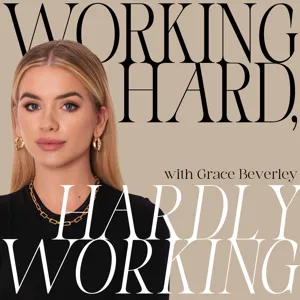Podcast Summary
From loss to growth: Maya Shankar's inspiring journey and the power of text messages: Passion, determination, and creativity can lead to extraordinary outcomes, while simple actions like text messages can have significant impacts.
Even in the face of loss or limitations, with determination and creativity, we can find renewal and growth. Maya Shankar's story, shared on Hidden Brain, is a perfect example. Despite not having a formal music education, Maya's passion for the violin and her mother's innovative efforts led her to become an exceptional musician. The tale also highlights the power of text messages in increasing college enrollment rates by 9%. This simple yet profound finding demonstrates the potential impact of small actions. As Elizabeth Bishop's poem suggests, embracing loss and moving forward can lead us to unexpected discoveries.
A chance encounter leads to a life-changing opportunity for a young violinist: Hard work, passion, and taking risks can lead to seizing opportunities and achieving remarkable outcomes
Determination and seizing opportunities can lead to remarkable achievements. Maya, a young violinist, stumbled upon a chance encounter at the Juilliard School that changed her life. By asking to play for a teacher, she impressed them and was accepted into a summer program. Her talent and passion continued to shine, leading to opportunities to play for renowned musicians like Izzak Perlman. Despite not having formal training in reading music, Perlman saw her musical ability and accepted her as his student. Maya's story is a testament to the power of hard work, passion, and taking risks to pursue one's dreams. Opportunities may not always present themselves, but when they do, being ready and seizing them can lead to incredible outcomes.
Learning from Within: Maya's Journey with Mr. Perlman: Effective learning involves thinking critically, finding solutions, and adapting to challenges for personal growth and success.
Effective learning and problem-solving come from within. As Maya's story illustrates, her teacher, Mr. Perlman, didn't just teach her the technical aspects of playing the violin. Instead, he encouraged her to think critically and find her own solutions. This approach was put to the test when Maya injured her hand and had to learn to play solely with her bow arm. Despite the challenge, she persevered and continued to develop her skills, ultimately discovering the value of resilience and self-reliance in her learning journey. These lessons served her well when she faced setbacks, such as her eventual inability to continue playing due to a hand injury. Though she was devastated, she learned to find new passions and identify her strengths beyond music. Thus, the ability to think for oneself, problem-solve, and adapt to challenges is a crucial skill for personal growth and success.
From violin to cognitive science and policy: Even when faced with significant setbacks, curiosity and resilience can lead to new passions and impactful careers.
Even when faced with seemingly insurmountable challenges, like losing the ability to play an instrument that brought immense joy, it's possible to find new passions and purposes. Maya Shankar, our guest, shares her story of discovering cognitive science after an injury forced her to retire from violin playing. Her thirst for knowledge led her to pursue a PhD at Oxford on a Rhodes Scholarship and a promising career in academia. However, an encounter with her undergraduate advisor during a Thanksgiving break sparked a new interest in using research insights from the behavioral sciences to influence public policy. This led her to work on automating the process of enrolling students in free and reduced-price school lunches, which resulted in millions of students gaining access to nutritious meals and thriving at school. Maya's journey illustrates the power of resilience, curiosity, and the ability to pivot when circumstances change.
Persistence and effective communication lead to policy impact: A postdoc without political background reached out to the Obama administration, pitched ideas, and formed a team to apply behavioral science to policy, resulting in successful projects like simplifying school lunch program communication.
Persistence and the ability to effectively communicate research findings can lead to significant policy impact, even for those without prior political connections. Maya, a postdoc with no political background, used her mother's encouragement to reach out to Thomas Khalil in the Obama administration, pitching ideas for applying behavioral science to public policy. Her proposal about using social norms to motivate energy conservation resonated, leading to her joining the White House and forming a team to implement behavioral insights in policy. One successful project was improving communication for the school lunch program, simplifying verification steps, translating materials into multiple languages, and introducing mobile verification options. This demonstrates the power of sharing research and being persistent in pursuing opportunities to make a difference in policy.
Understanding the complexities of human behavior: Clear communication and simple interventions can help individuals make the best decisions for themselves, leading to significant improvements in areas like college enrollment.
While it may seem rational to follow the steps necessary to receive benefits from programs, human behavior often does not align with this expectation. The work of Maya and her team, as discussed, highlights the importance of clear communication and simple interventions to help individuals make the best decisions for themselves. A notable example is their intervention to increase college enrollment rates through text messages, which resulted in a significant 9% increase. This experience of feeling stuck and then discovering new opportunities can happen to anyone, and it's essential to remember that there may be many paths to explore throughout one's life. The pursuit of a violin, for instance, can reveal passions and traits that can be applied to new endeavors. Ultimately, it's crucial to recognize the complexities of human behavior and the potential for growth and change in our lives.
Embrace Change and Reinvent Yourself: Despite life's stages and choices, we have the ability to adapt, find new opportunities, and make a positive impact on the world.
No matter what stage of life we're at or what paths we've taken, we have the capacity to adapt, reinvent ourselves, and continue to make a positive impact on the world. Maya Shankar's journey from a White House advisor to Google's first head of behavioral insights demonstrates this. As we close one chapter of our lives, there are always new opportunities to explore. As Elizabeth Bishop's poem "One Art" reminds us, "Anything you lose can be found if you look beside all the right lost places." So, let's embrace change, keep our core values in mind, and continue to seek out ways to help and improve people's lives.
Embracing Loss and Believing in Others: Loss is a natural part of life, and with the right support and mindset, it can lead to personal growth and new opportunities. Believing in and supporting others can help them unlock their potential and create something meaningful.
The ability to embrace loss and move forward is a valuable skill. Elizabeth Bishop's poetry encourages us to see that loss is a natural part of life and not a disaster. Amy Mann's reading of Bishop's work emphasizes that even significant losses, such as homes, cities, and loved ones, can be endured. Moreover, the story of Paul Ginsburg's support for Hidden Brain highlights the importance of encouragement and belief in others. Paul not only provided the necessary resources but also saw potential in Shankar Vedantam that he himself did not recognize. His faith and support led to the creation of Hidden Brain and a new path for Shankar. Therefore, the art of losing, as described by Elizabeth Bishop, and the power of believing in and supporting others, as demonstrated by Paul Ginsburg, are two valuable lessons from this discussion. Embracing loss and finding the strength to move forward, and recognizing and nurturing potential in others, can lead to personal growth and new opportunities.






